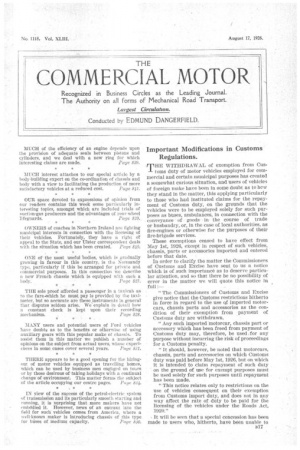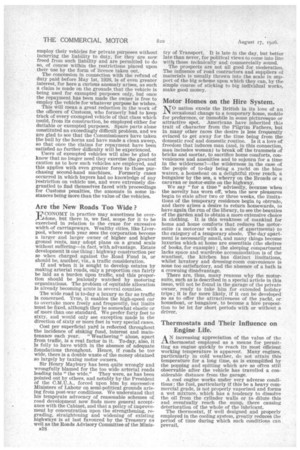Important Modifications in Customs Regulations.
Page 1

Page 2

If you've noticed an error in this article please click here to report it so we can fix it.
IrrHE WITHDRAWAL of exemption from Cus toms duty of motor vehicles employed for commercial and certain municipal purposes has created a somewhat curious situation, and users of vehicles of foreign make have been in some doubt as to how they stand in the matter, this applying particularly to those who had instituted claims for the repayment of Customs duty, on the grounds that the -vehicles were to be employed solely for such purposes as buses, ambulances, in connection with the conveyance of goodsin the course of trade or husbandry, or, in the case of local authorities, as fire-engines or otherwise for the purposes of their fire-brigade services.
These exemptions ceased to have effect from May 1st, 1926, except in respect of such vehicles, chassis, parts or accessories imported and entered before that date.
In order to clarify the matter the Commissioners of Customs and Excise have sent to us a notice which is of such importance as to deserve particular attention, and so that there be no possibility of error in the matter we will quote this notice in full :— • "The Commissioners of Customs and Excise • give notice that the Customs restrictions hitherto in force in regard to the use Qf imported motorcars, chassis parts and accessories as the condition of their exemption from payment of Customs duty are withdrawn.
"Any such imported .motorcar, chassis part or accessory which has been freed from payment of Customs duty may, therefore, be used , for anypurpose without incurring the risk of proceedings • for a Customs penalty.
"It should, however, be noted that motorcars, chassis, parts and accessories on which Customs duty was paid before May 1st, 1926, but on which It is intended to claim repayment of such duty on the ground of use for exempt purposes must be used solely for such purposes until repayment • has been made.
"This notice relates only to restrictions on the use of vehicles consequent on their exemption from Customs import duty, and does not in any way affect the rate of duty to be paid for the licensing of the vehicles under the Roads Act, 1920."
. It will be seen that a special concession has been made to users who, hitherto, have been unable to employ their vehicles for private purposes without incurring the liability to duty, for they are now freed from such liability and are permitted to do so, of course within the restrictions placed upon their use by the form of licence taken out. The concession in connection with the refund of duty paid before May 1st, 1926, is of even greater interest, for here a curious anomaly arises, as such a claim is made on the grounds that the vehicle is being used for exempted purposes only, but once the repayment has been made the owner is free to employ the vehicle for whatever purpose he wishes. This will mean a great reduction in the work of the officers of Customs, who formerly had to keep track of every exempted vehicle of that class which could, from its construction, be employed either for dutiable or exempted purposes. Spare parts alone constituted an exceedingly difficult problem, and we are glad to see that the Commissioners have taken the bull by the horns and have made a clean sweep, so that once the claims for repayment have been .satisfied no further difficulty will be experienced. Users of exempted vehicles will also be glad to know that no longer need they exercise the greatest caution as to how such vehicles are employed, and this applies with even greater force to those purchasing second-hand machines. Formerly cases occurred in which buyers had no knowledge of any k.estriction on vehicle use, and were extremely disgruntled to find themselves faced with proceedings for Customs penalties, the amounts in some instances being more than the value of the vehicles.
Are the New Roads Too Wide ?
ECONOMY in practice may sometimes be overdone, but there is, we feel, scope for it to be exercised in relation to the craze for excessive width .of carriageways. Wealthy cities, like Liverpool, where each year sees the corporation become a larger and larger owner of higher and higher ground rents, may adopt plans on a grand scale without suffering—in fact, with advantage. Estate development IS one thing: highway construction per se when charged against the Road Fund is, or should be, another, viz., a traffic consideration. If and when it is sought to develop estates by making arterial roads, only a proportion can fairly be laid as a burden upon traffic, and this proportion should be jealously watched by motoring organizations. The problem of equitable allocation is already becoming acute in several counties. The wide road is to-day a luxury so far as traffic is concerned. True, it enables the high-speed car to overtake more freely and frequently, but limits must be fixed, although they be somewhat elastic or of more than one standard. We prefer forty feet to sixty, and would only see exception made in the direction of sixty or more feet in very special cases. • Cost per superficial yaed is reflected throughout The incidence of sinking fund, interest and maintenance each year. " Weathering " alone, apart from traffic, is a real factor in it. To-day, also, it )s folly to have width in the absence of adequate foundations throughout Hence, if roads be too wide, there is a double waste of the money obtained so largely by taxing motor owners. Sir Henry Maybury has been quite wrongly and wrongfully blamed for the too wide arterial roads leading into "the wide." They were, as has been pointed out by others, and notably by the President of the C.M.U.A., forced upon him by. successive Ministers of Labour on semi-political grounds arising from post-war conditions. We understand that his temperate advocacy of reasonable schemes of road development now finds more general acceptance with the Cabinet, and that a policy of improvement by concentration upon the strengthening, regrading, straightening and widening of existing highways is at last favoured by the Treasury as well as the Roads Advisory Committee of the Minis B18 try of Transport. It is late in the day, but better late than never, for political views to come into line with; those technically and commercially sound. The prospects are not all good for moderation. The influence of road contractors and suppliers of materials is usually thrown into the scale in support of the big scheme upon which they can, by the simple course of sticking to big individual works, make good money.
• Motor Homes on the Hire System.
1\10 nation excels the British in its love of an 11 occasional change to a temporary home, mobile for preference, or immobile in some picturesque or attractive spot. Americans have inherited this trait of character from the Pilgrim Fathers, but In many other races the desire is less frequently evinced to get away for the time being from the domestic roof and domestic routine. Is it a love of freedom that induces man (and, in this connection, man includes woman) to break off the trammels of bricks and mortar, to sacrifice home comforts, conveniences and amenities and to sojourn for a time in the wilderness ?—the wilderness in the case of the people of to-day being a yacht on the blue waters, a houseboat on a delightful river reach, a bungalow by the sea, a wherry on the Broads or a caravan or motor-suite on the highway. We say "for a time" advisedly, because when the novelty has worn off, when the new pleasures begin to stale after two or three weeks, the limitations of the temporary residence begin te obtrude, and there arises a desire to return homewards, to have again the run of the library, to see the beauties of the garden and to obtain a more extensive choice in clothing. It is this weakness of mankind for home and home comforts that reduces the motorsuite (a motorcar with a suite of apartments) to the category of a temporary abode. The day apartment is necessarily small, and many things become luxuries which at home are essentials (the shelves of books, for example); • the sleeping compartment lacks space and wardrobe accommodation is of the scantiest, the kitchen has distinct limitations, whilst lavatory and dressing-room convenience is none too satisfactory, and the absence of a bath is a crowning disadvantage. There are, thus, many reasons why the motorsuite, such as is described in a special article in this issue, will not be found in the garage of the private owner, ready to take him for extended holiday trips; it is far more likely, if it can be developed so as to offer the attractiveness of the yacht, or houseboat, or bungalow, to become a hire proposition to be let for short periods with or without a driver.
Thermostats and Their Influence on Engine Life.
AN increasing appreciation of the value of the thermostat employed as a means for permitting an engine quickly to reach its most efficient working temperature is apparent. Many engines, particularly in cold weather, do not attain this temperature for a long time, as is exemplified by the popping and spitting which are so often still observable after the vehicle has travelled a considerable distance from the garage. A cool engine works under very adverse conditions: the fuel, particularly if this be a heavy commercial grade, is not properly vaporized and forms a wet mixture, which has a tendency to dissolve the oil from the cylinder walls or to dilute this and eventually reach the sump, there causing deterioration of the whole of the lubricant. The thermostat, if well designed and properly employed in the cooling system, greatly reduces the period of time during which such conditions can• prevail.




























